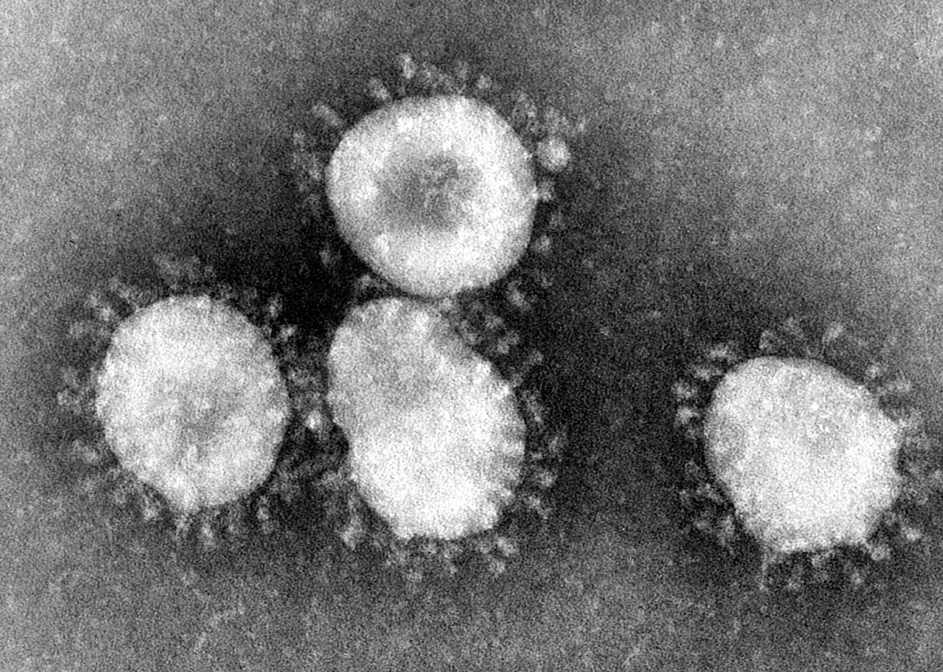

(from Coronavirus : les experts UCLouvain vous informent)
10/04/2020
The word “coronavirus” has been everywhere for several weeks. But what do we know about it? Thomas Michiels, Professor at UCLouvain and researcher in Molecular Virology at the Duve Institute, reveals the origins of this virus that no one can ignore anymore.
Coronaviruses are viruses surrounded by a membrane called an "envelope." This envelope is bristling with glycoproteins which form protrusions on the surface of the virus, called spicules (or "spikes"). In electron microscopy, the spiky envelope gives the virus the appearance of a crown, hence its name of coronavirus. This envelope, which is necessary for infection of cells by the virus, is made up of a membrane of phospholipids, which makes the virus particularly vulnerable to detergents and desiccation. This explains the recommended hand hygiene measures to limit the transmission of the virus. The genetic information in this virus is an RNA molecule with a positive polarity of around 30,000 nucleotides. It is one of the largest RNA viruses.

|
View of coronaviruses with electron microscopy |
Several coronaviruses (such as HCoV-229E or HCoV-OC43) are regularly responsible for respiratory infections in humans. These infections are most often mild (simple colds) but can sometimes be serious in particularly sensitive people, especially immunocompromised people.
In 2002 the epidemic of SARS (Severe Acute Respiratory Syndrome) broke out, a coronavirus originating from certain bats which is said to have been transmitted to humans via the civet. More recently in 2013, another bat coronavirus, named MERS (Middle East Respiratory Syndrome), appeared in the Middle East and is occasionally reported to be transmitted to humans via dromedaries. The risk of mortality in this case is very high. The coronavirus that appeared in Wuhan last December was called SARS-CoV-2, the nucleotide sequence of its genome having identified it as a close cousin of the SARS virus. The disease induced by SARS-CoV-2 has been called Covid-19. As in 2002, the virus is also believed to originate from the bat, but this time would have passed through the pangolin to reach us.
Symptoms of the disease are mainly fever, cough and difficulty breathing. Unlike the coronaviruses conventionally encountered in humans, which most often remain confined to the upper respiratory tract, the Covid-19 virus would, like the SARS virus, have a certain tropism for the lower respiratory tracts, which explains why it is sometimes responsible for serious pneumonia.
To find out more about SARS-CoV-2 and the Covid-19 pandemic, please find below all of Thomas Michiels' interventions in the media:
ScienceToday - Broad spectrum antivirals: a complicated mission … but not impossible! - 29/04/2020
EN24.news - “Globalization worsens the pandemic” say scientists to the president of the MR - 1/04/2020
RTBF.be - Une même mutation chez les variants britannique et sud africain, ou la loi du plus fort parmi les lignées du coronavirus - 5/02/2021
FemmeActuelle.fr - Covid-19 : le régime alcalin peut-il vous protéger du virus ? - 29/10/2020
Factuel.AFP.com - Reconnaître et "éliminer" le Covid-19 : attention, cette publication contient de fausses affirmations - 28/10/2020
EnMarche.be - Les virus, ces drôles de (fausses) petites bébêtes… - 20/05/2020
RTBF.be - Les appareils à UV pour désinfecter, une solution miracle ? - 19/05/2020
Moustique.be - Covid-19: des symptômes toujours plus nombreux - 23/04/2020
LeVif.be - Les experts de l'UCLouvain vous répondent : "Une piste pour lutter contre ces infections" - 20/04/2020
L'avenir.net - Le coronavirus : bien au-delà d'une insuffisance respiratoire - 17/04/2020
RTBF.be - "La distanciation de 1m50, c'est de la foutaise" : vrai ou faux ? - 16/04/2020
LeJDE.be - Covid-19: en savoir plus - 16/04/2020
RTL.fr - Coronavirus : comment les micro-gouttelettes se maintiennent longtemps dans l'air - 10/04/2020
Nutrition&Sport&Health - Tout savoir sur le Covid-19 : Interview du Pr Michiels de l'UCLouvain (podcast) - 9/04/2020
APR-News.fr - Japon : Les scientifiques démontrent comment on attrape le Covid-19 - 7/04/2020
RTBF.be - Covid-19: Les micro-gouttelettes porteuses du virus ? - 3/04/2020
RTBF.be - Coronavirus : "La mondialisation aggrave la pandémie" - 1/04/2020
LN24.be - La chloroquine est-elle une solution miracle ? (video) - 1/04/2020
Moustique.be - Coronavirus: la piste de la mutation fait son retour - 31/03/2020
LeSoir.be - Coronavirus: «L’hypothèse d’une disparition à court ou moyen terme se fait de moins en moins probable» - 20/03/2020
LaLibre.be - Une disparition à court ou moyen terme du virus de moins en moins probable - 20/03/2020
LeSoir.be - Coronavirus: le danger de la mutation, une crainte récurrente - 16/03/2020
LeSoir.be - Ces nouveaux gestes de salut inspirés par le coronavirus - 11/03/2020
RTBF.be - Coronavirus : quand l'épidémie va-t-elle s'éteindre ? - 9/03/2020
RTBF.be - La dengue, la fièvre jaune et le paludisme font bien plus de ravages dans le monde que le coronavirus - 3/03/2020
RTL.be - Coronavirus : ce virus sera-t-il saisonnier comme la grippe ? - 3/03/2020
Verietyinfo.com - Dezelfde mutatie in de Britse en Zuid-Afrikaanse versie, of de wet is de sterkste onder de coronaviruslijnen - 5/02/2021
Also on VivreIci.be, DHnet.be, YahooStyle.com, HeadTopics.com & VivreIci.be